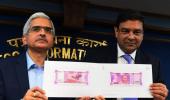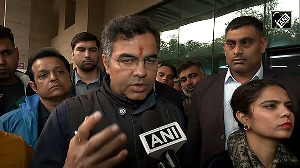Finance Minister Arun Jaitley should not drop the ball on continuing the battle against black money and move towards digital transactions to reduce the preponderance of cash in the economy, says A K Bhattacharya.

Make no mistake about it. The Union Budget for 2017-18, to be presented in less than a week, should be primarily judged in the context of what the government needs to do in the aftermath of demonetisation that was ordered on November 8.
To believe that the impact of demonetisation has by and large been contained and the economy is bouncing back, recovering from the early shocks, may well tantamount to ignoring the larger and more substantive agenda for action on what needs to be done through the forthcoming Budget.
One of the original objectives of demonetisation was to tackle the menace of black money. That so far has not been comprehensively achieved with almost 97 per cent of the demonetised currency notes reported to have returned to the banks.
The final figure may be different, but it will be nowhere near the 70 per cent estimated earlier.
Within a week or two of demonetisation, the government had told the Supreme Court that about Rs 4-5 lakh crore of the total Rs 15.44 lakh crore of demonetised currency notes were not expected to surface and this amount would eventually get ‘neutralised’.
As some more weeks after November 8 passed by, the government realised that far less than Rs 4-5 lakh crore would be ‘neutralised’.
It is true that not all the money that has been returned to banks is legitimate or white money.
The income tax department is busy scrutinising these deposits. Going by indications available from government officials, the taxman is likely to somehow pounce on at least Rs 4-5 lakh crore of deposits to declare that black money.
The government may heave a sigh of relief as it will have some decent figure to talk about as the black money unearthed through demonetisation, but it will also realise that little has been achieved to strike at the root of the black economy or stem the generation of unaccounted wealth.
A secondary goal of demonetisation, identified and promoted by the government a few weeks after November 8, was to encourage digital transactions and phase out the preponderance of cash in economic activities.
This goal, if achieved through careful, prudent and gradual implementation of policies, can bring about a fundamental change in the Indian economy and give it a new direction with many collateral gains even by attacking the black economy in the country.
But there is no denying the hugely disruptive impact of demonetisation -- whether to tackle black money or to encourage digital transactions.
The pattern of disruption and the pace of recovery in the coming months are difficult to predict. And the success or failure of Finance Minister Arun Jaitley’s fourth successive Budget will largely depend on how he uses the current situation as an opportunity to secure more sustainable benefits for the economy.
What then should Mr Jaitley do on February 1?
Most importantly, he should not drop the ball on continuing the battle against black money and move towards digital transactions to reduce the preponderance of cash in the economy.
This would require him to use the Budget to unveil a host of measures to complete what certainly looks to be an unfinished task -- both eliminating black money generation and reducing the share of cash in gross domestic product from the pre-November 8 high of 12 per cent to a more reasonable and moderate level in keeping with the trend in other developing economies of India’s size and complexity.
The problem is that Prime Minister Narendra Modi’s address to the nation on December 31 created an impression that while tax evaders would be punished, no further steps to tackle black money were on the anvil and it was time to roll out the concessions to apply the balm on citizens who were bruised by demonetisation.
Mr Jaitley needs to firmly reject that impression through policy actions in his Budget.
And he could do so with a combination of fiscal and non-fiscal measures -- remember that the annual Budget exercise is not just an opportunity to make a financial statement along with taxation changes, but also an occasion to make necessary economic policy announcements.
To start with, Mr Jaitley should consider focussing on five areas.
One, he could outline the government’s action plan to make completely transparent the process of funding elections, financial dealings of political parties and all donations to political parties. Some tinkering with the limits on permissible cash donation that can be received by political parties has already been done.
It is time that a legal bar was imposed on acceptance of cash donations by any political leader or political party, of course after due consultation with all the stake holders, including the Election Commission.
Two, it has been widely recognised that real estate transactions generate black money in plenty.
If a national real estate law could be introduced to discipline real estate builders, it is perhaps time for Mr Jaitley to initiate a Centre-state consultative process to at least reduce, if not eliminate, stamp duties on real estate transactions and to realign circle rates (the minimum price level for registering land or real estate) in all major towns and cities to bring them on a par with the prevailing market price.
Three, no cash transactions in gold above a specified value should be allowed. Indeed, such a limit can be prescribed for all high-value transactions in various areas.
Why shouldn’t restaurant or hotel bills above a certain level allowed to be settled only through cheques or cards?
Four, Mr Jaitley should not only reduce and rationalise (remove exemptions) tax rates, but also reform tax administration.
There is no reason why the digital push should not impact the taxman as well so that human interfaces are reduced to the minimum and tax assessment or tax scrutiny undertaken without the venality that they are often associated with.
And finally, the finance minister has to take a call on the ideal level of high-denomination currency notes that should be circulating in the economy.
If the economy sees the return of the same amount of cash, which circulated before November 8, the movement towards digital transactions is likely to be adversely hit.
Mr Jaitley must take a considered call on this issue as well, and the Budget would be a good occasion to outline his game plan on this front.












 © 2025
© 2025